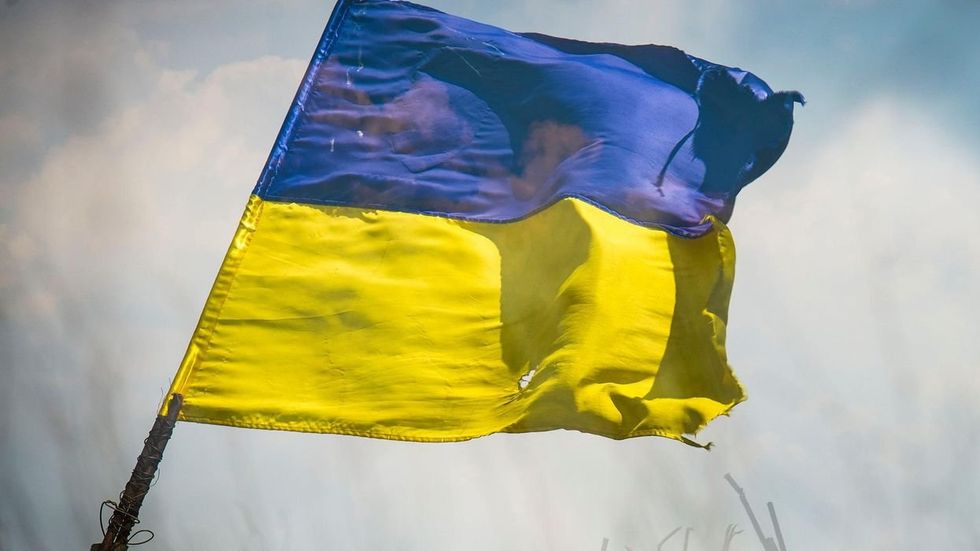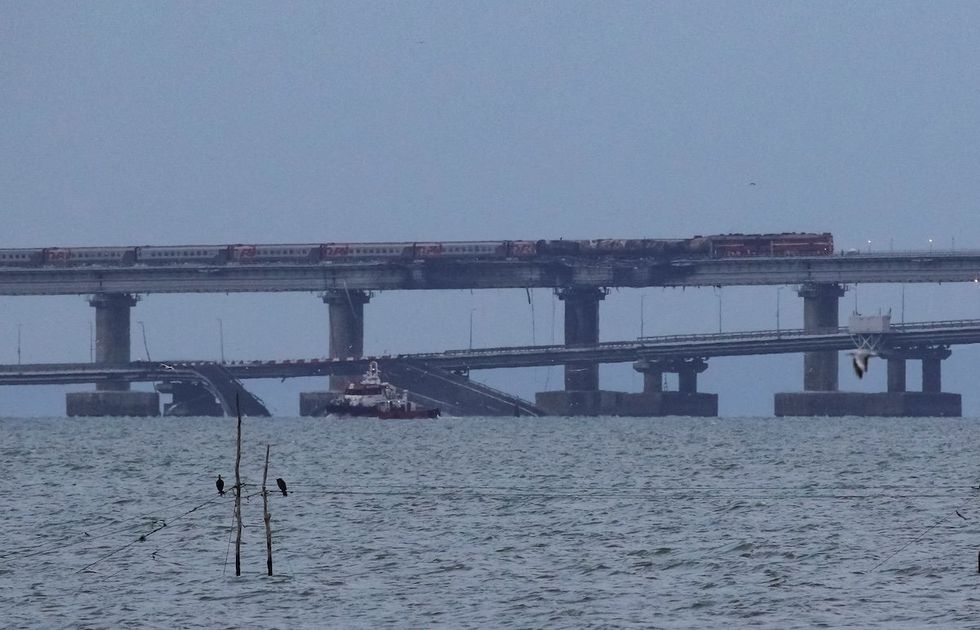Trending Now
We have updated our Privacy Policy and Terms of Use for Eurasia Group and its affiliates, including GZERO Media, to clarify the types of data we collect, how we collect it, how we use data and with whom we share data. By using our website you consent to our Terms and Conditions and Privacy Policy, including the transfer of your personal data to the United States from your country of residence, and our use of cookies described in our Cookie Policy.
{{ subpage.title }}
Russia-Ukraine: Two Years of War
It's been two years since Russia's invasion of Ukraine on Feb. 24, 2022, and the war is still raging. GZERO looks back at the pivotal moments of the past 24 months.
The Latest:
Listen:
___________
Feb. 24, 2022: Russia launches “special military operation” in Ukraine
On Thursday, Feb. 24, 2022, Russian President Vladimir Putin launches a large-scale invasion of Ukraine, labeling it a "special military operation." The aim? The "demilitarization and denazification" of Ukraine, according to Putin, who warns of inevitable clashes between Russian and Ukrainian forces. Any bloodshed, he says, would be on Ukraine’s hands.
- Ian Bremmer: This is a turning point in the global order
- Russia-Ukraine crisis: What you need to know
Feb. 28, 2022: The ruble nosedives
Days after Russian troops invade eastern Ukraine, the country's currency plummets, shedding up to 30% of its value against the US dollar. This drastic decline follows allied sanctions, specifically targeting Russia’s central bank and major lenders. Such a sharp depreciation of the ruble has occurred only twice before: during the 1998 Russian financial crisis and again in late 2014.
March 2022: Putin = Common denominator
Putin Past the Point of No Return | Putin's Europe Problem | GZERO World with Ian Bremmerhttps://www.gzeromedia.com/gzero-world-with-ian-bremmer/putins-europe-problem
While NATO forces aren't directly engaged, the US and its allies support Ukraine through arms, financial aid, and stringent sanctions against Moscow. Vladimir Putin's approach, reminiscent of past-century warfare, falters in the modern era of global PR and social media dominance. The repercussions extend far beyond Ukraine, capturing the attention of countries like Finland, transitioning from neutrality to NATO hopeful. Former Finland PM Alexander Stubb, reflecting on Putin's stance and China's hesitance to fully support Russia, highlights the evolving geopolitical dynamics. On this award-winning episode of GZERO World, Ian Bremmer talks to Stubb, who once helped broker Russia's 2008 cease-fire with Georgia and believes Putin has backed himself into a corner but won't back down on Ukraine.
- Putin only understands power and force, says Finland’s former PM
- Civilians gear up: “This is not a suicide mission” – the Wolverines of Ukraine
April 2022: Russia retreats from Kyiv, Bucha massacre uncovered
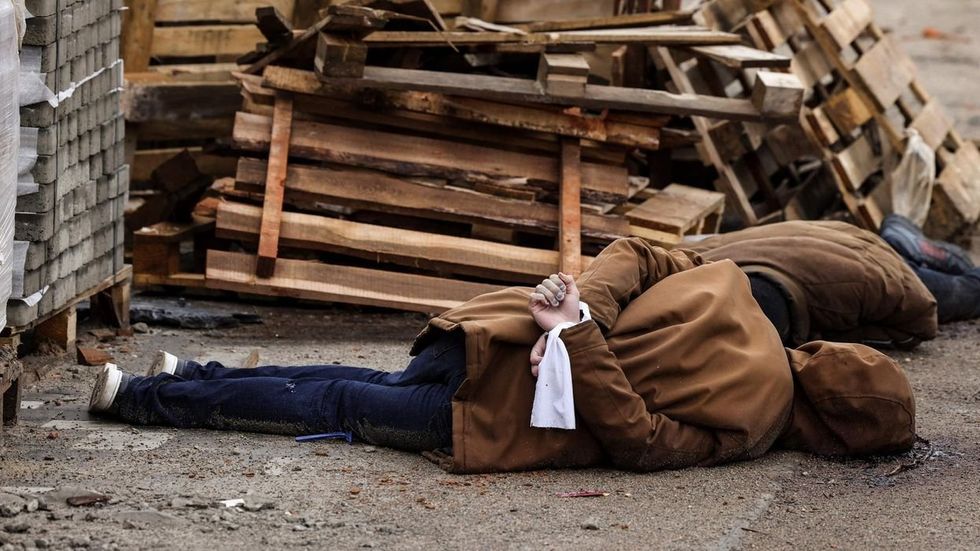 Is Putin's war in Ukraine genocide?https://www.gzeromedia.com/by-ian-bremmer/is-putin-s-war-in-ukraine-genocide
Is Putin's war in Ukraine genocide?https://www.gzeromedia.com/by-ian-bremmer/is-putin-s-war-in-ukraine-genocide
As Ukrainian forces retake Kyiv and Russian troops begin retreating to eastern and southern Ukraine, gruesome images surface from Bucha, a Kyiv suburb, revealing that civilians – women, children, and elderly – lay dead in the streets. Ukrainian officials and independent sources share horrific accounts of rape, torture, and execution by Russian soldiers, and hundreds of victims are found in mass graves. Russia denies responsibility and instead points fingers at Ukraine.
- Is Putin's war in Ukraine a genocide?
- The price of Russian defeat
- Zelensky wants justice over Russian war crimes
- Russian military on the ropes
June 2022: Russia withdraws from Snake Island
Russia retreats from Snake Island, with the Kremlin calling it a "gesture of goodwill" to disprove the hindrance of Ukrainian food exports, but Ukrainians credit their missile strikes. The blockade disrupted Ukraine's monthly grain exports of five million metric tons, spiking global food prices and sparking famine fears in Africa. Zmiinyi Island, 22 miles off Ukraine's coast, offers strategic advantages, but its capture hindered Kyiv's defense of the southwestern coast and Odesa port. While a Ukrainian victory, naval weakness hampers food export resumption, underscoring Kremlin's Donbas focus.
August 2022: Fighting around Zaporizhzhia power plant raises fears
Ukrainian Nuclear Power Plant in Peril | US Energy Secretary Granholm | GZERO Worldhttps://www.gzeromedia.com/gzero-world-clips/us-en...
Artillery duels erupt at Europe’s largest nuclear power station in Zaporizhzhia, southern Ukraine, now under Russian occupation. Both sides accuse the other of instigating the conflict. The IAEA raises concerns over the potential for a nuclear catastrophe, as shelling severely damages radiation sensors near a spent fuel storage unit. President Volodymyr Zelensky condemns the situation as “Russian nuclear terror.”
Sept. 11, 2022: Ukraine pushes back, reclaims over a thousand square miles
On the 200th day of the war, the Ukrainian military achieves its most significant gains against Russia since the invasion began. President Volodymyr Zelensky declares the liberation of over 1,000 kilometers of territory, pledging to "de-occupy" completely.
Sept. 21, 2022: Russia calls up reservists
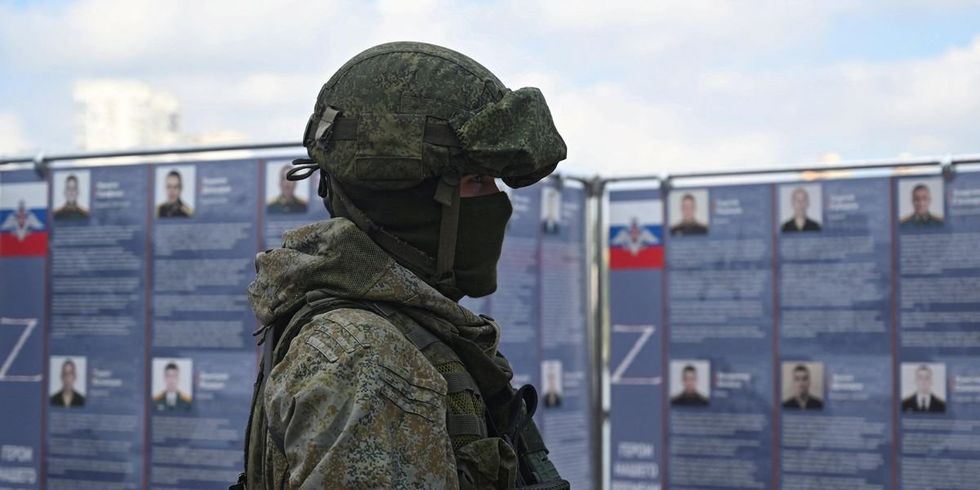 Russia calls up reservistshttps://www.gzeromedia.com/what-we-re-watching-iran-protests-spread-putin-mobilizes-ny-sues-trumps-china-faces-slow-growth
Russia calls up reservistshttps://www.gzeromedia.com/what-we-re-watching-iran-protests-spread-putin-mobilizes-ny-sues-trumps-china-faces-slow-growth
Vladimir Putin dramatically ups the ante and orders the partial mobilization of up to 300,000 reservists for the war in Ukraine. Ukrainian defiance persists, with Western leaders, including US President Joe Biden, reaffirming their commitment to pressure Putin's government and military. Meanwhile, Russia grapples with internal unrest, evident in protests and a surge of draft-age men fleeing the country. While Putin stops short of full mobilization, ongoing setbacks in the "special military operation" raise concerns about future escalations.
- The script for conscripts: Inside Putin’s (partial) mobilization
- QuickTake with Ian Bremmer: Putin cornered
- António Guterres: Ukraine war united NATO but further divided the world
Sept. 26, 2022: Who blew up Nord Stream?
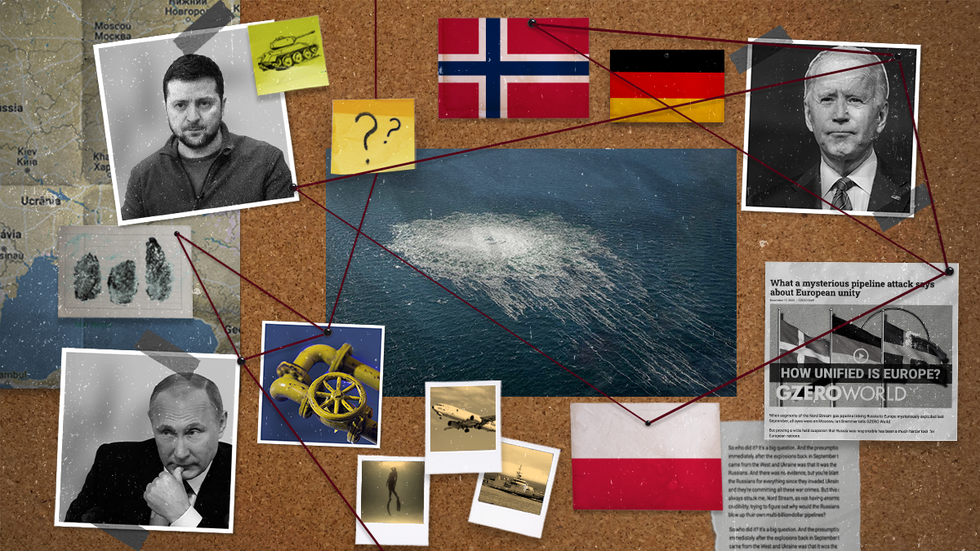 Who blew up Nord Stream?
Ian Bremmer
Who blew up Nord Stream?
Ian Bremmer
The controversial Nord Stream gas pipelines connecting Russia to Germany and Europe are sabotaged, leading to multiple investigations into whodunnit.
- Did someone blow up the Nord Stream pipelines?
- Another Baltic pipeline whodunnit
- Who blew up Nord Stream?
September 2022: Russia holds referenda in occupied parts of eastern Ukraine
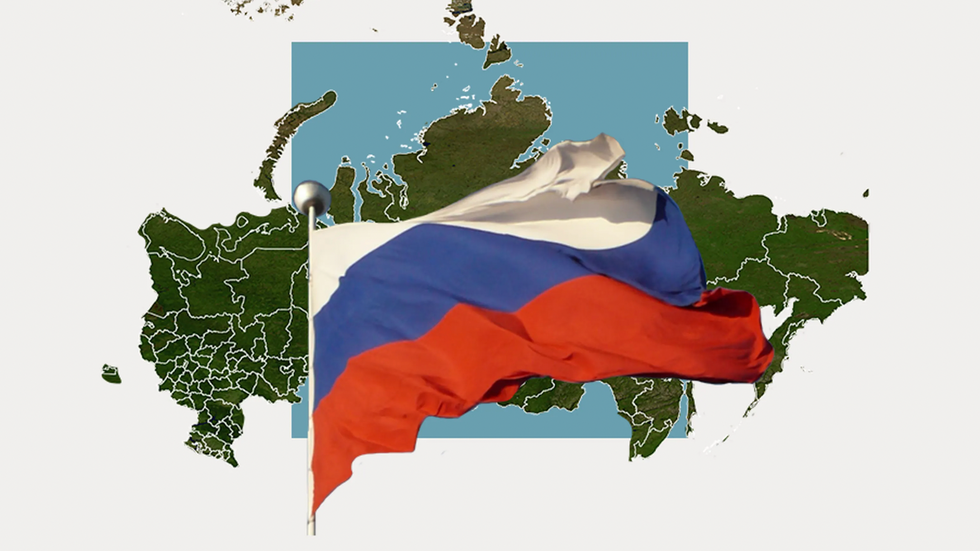 Russian annexationshttps://www.gzeromedia.com/what-we-re-watching-russian-annexations-the-india-pakistan-us-tango
Russian annexationshttps://www.gzeromedia.com/what-we-re-watching-russian-annexations-the-india-pakistan-us-tango
Putin’s sham referenda in four regions of Ukraine officially moves forward to annexations. Yet, with ongoing clashes, Luhansk, Donetsk, Zaporizhzhia, and Kherson remain battlegrounds. Securing control amid Ukrainian resistance could provide Putin with a strategic land bridge from southeastern Ukraine to Crimea, annexed in 2014. While Russia holds Luhansk and Kherson, and portions of Zaporizhzhia and Donetsk, Ukrainian forces persist in gaining ground. The referenda offer Putin a pretext, framing Ukrainian/Western attacks as assaults on Russia. Amid a faltering war, Putin terms it an "anti-colonial movement." In response, Ukrainian President Volodymyr Zelensky seeks accelerated NATO accession.
Oct. 8, 2022: Kerch Bridge blast
Russia launches a series of airstrikes targeting major Ukrainian cities: Kyiv, Kharkiv, Odesa, and even Lviv, previously deemed a haven. The attacks, hitting civilian areas during rush hour, inflict considerable damage to infrastructure, causing power outages and driving civilians into bomb shelters. While the death toll remains unconfirmed, casualties are expected to be substantial. This military escalation follows Saturday's explosion on the Crimea-Russia Kerch bridge, which Putin attributes to Ukrainian "terrorists." The strikes were ordered before Putin's National Security Council meeting, suggesting retaliation planning. Though the Kremlin has yet to comment officially, Putin ally Ramzan Kadyrov expresses satisfaction, advocating for reprisals against Ukrainian infrastructure.
- Putin lashes out after Crimea bridge blast
- Russian revenge vs. Ukrainian resolve
- Following Ukraine’s Crimea bridge attack, expect Putin to escalate "until he collapses"
January 2023: US and Germany offer tanks
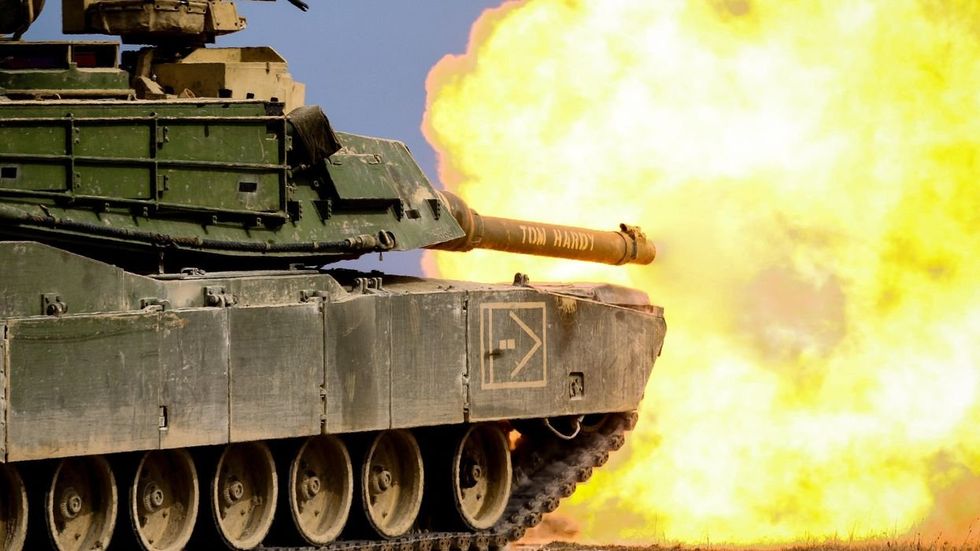 Ukraine tanks uphttps://www.gzeromedia.com/ukraine-tanks-up
Ukraine tanks uphttps://www.gzeromedia.com/ukraine-tanks-up
German Chancellor Olaf Scholz announces Germany's decision to send Leopard 2 battle tanks to Ukraine, following pressure from NATO countries led by Poland. Berlin initially resisted, concerned about antagonizing Russia and awaiting US action on supplying Abrams tanks. Two tank battalions, totaling roughly 80 Leopard 2 tanks, will be deployed to Ukraine, with training for Ukrainian soldiers commencing in Germany. However, US tank shipments may not arrive until spring, as the Ukrainian military lacks Abrams operation knowledge and maintenance supply lines and faces fuel consumption concerns.
- Ukraine tanks up
- Ukraine's killer dune buggies
- Zaporizhzhia nuclear plant at risk of disaster, says top nuclear watchdog
- Putin’s war crimes solidify West’s military support for Ukraine
- Russian unpredictability & Finland's border threat
February 2023: Biden visits Kyiv
Biden’s visit to Ukraine signals US commitment, but war gets tougher | Quick Take | GZERO Mediahttps://www.gzeromedia.com/quick-take/biden-visit-to-ukraine-signals-us-commitment-but-war-gets-tougher
President Biden makes a surprise trip to Kyiv, just before the first anniversary of Russia's invasion of Ukraine on Feb. 24. It's significant as the first visit by an American president since Russia's annexation of Crimea in 2014 and intervention in Southeast Ukraine. This underscores continued US commitment symbolically, boosts Ukrainian morale, and reassures NATO of America's unwavering prioritization of Ukraine, despite substantial aid and a year of conflict. The trip holds immense importance for diplomatic relations, emphasizing the enduring support for Ukraine amidst ongoing tensions with Russia.
June 8, 2023: Ukraine launches counteroffensive
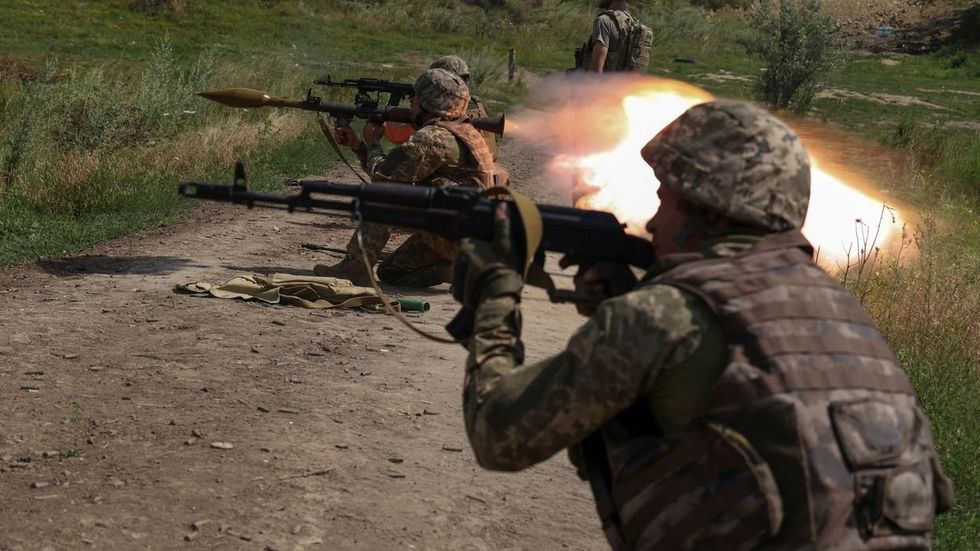 Ukraine ups the antehttps://www.gzeromedia.com/ukraine-ups-the-ante
Ukraine ups the antehttps://www.gzeromedia.com/ukraine-ups-the-ante
The New York Times reports that Ukraine's nearly two-month-old counteroffensive is ramping up in the southeast, per two anonymous Pentagon officials. Thousands of previously held-back reserves are now deploying to the front lines. Both Ukrainian and Russian reports corroborate this escalation. Whether Ukraine gains strategic ground or not marks a pivotal juncture in the war.
June 24, 2023: Prigozhin stages mutiny
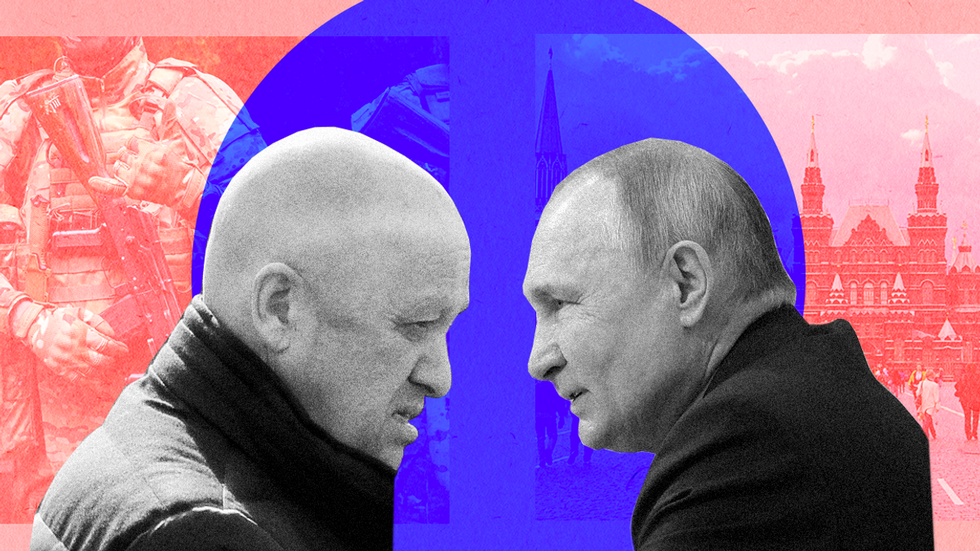 Russia’s aborted coup, explainedhttps://www.gzeromedia.com/by-ian-bremmer/russias-aborted-coup-explained
Russia’s aborted coup, explainedhttps://www.gzeromedia.com/by-ian-bremmer/russias-aborted-coup-explained
Wagner chief Yevgeny Prigozhin stages a failed mutiny against Vladimir Putin. Ian Bremmer predicts the move will be the beginning of the end of Prigozhin. According to Bremmer, Prigozhin, in the lead-up to his mutiny, had become increasingly erratic, indicative of his declining political influence. What's more, he directed fury at Russia’s Ministry of Defense, accusing them of sending thousands of soldiers to their deaths due to corruption, incompetence, and cowardice.
- Russia’s aborted coup, explained
- Former Russian intelligence officer: Prigozhin's threat to Putin is “ludicrous”
July 2023: Russia’s exit from the Black Sea Grain Deal
Russia's exit from Black Sea grain deal will drive up food prices | Europe In: 60https://www.gzeromedia.com/in-60-seconds/europe/russias-exit-from-black-sea-grain-deal-will-drive-up-food-prices
Russia announces its exit from the Black Sea grain deal, a move GZERO's Europe In :60 host and former Sweden PM Carl Bildt predicts would have severe consequences on global food prices. Continuous attacks on grain terminals near the Ukrainian-Romanian border aggravate the situation. Meanwhile, the progress of the Ukrainian counteroffensive slows down due to extensive Russian fortifications and mines. The Ukrainian army, largely composed of mobilized individuals with limited training, faces significant challenges.
Aug. 23, 2023: Prigozhin dies in plane crash
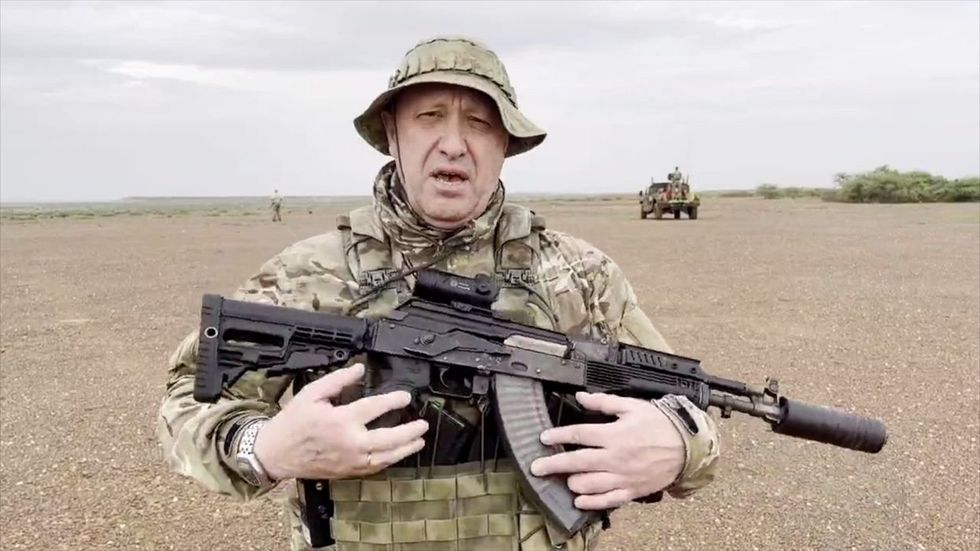 Wagner's Prigozhin dieshttps://www.gzeromedia.com/wagners-prigozhin-presu...
Wagner's Prigozhin dieshttps://www.gzeromedia.com/wagners-prigozhin-presu...
Russian state media reports a private aircraft crash outside Moscow, killing all 10 aboard, including Yevgeny Prigozhin, the Wagner Group warlord behind a failed mutiny against the Kremlin in June.
September 2023: Peace in Ukraine is world's priority, says UN chief António Guterres
November 2023: US govt avoids shutdown, cuts Ukraine funding
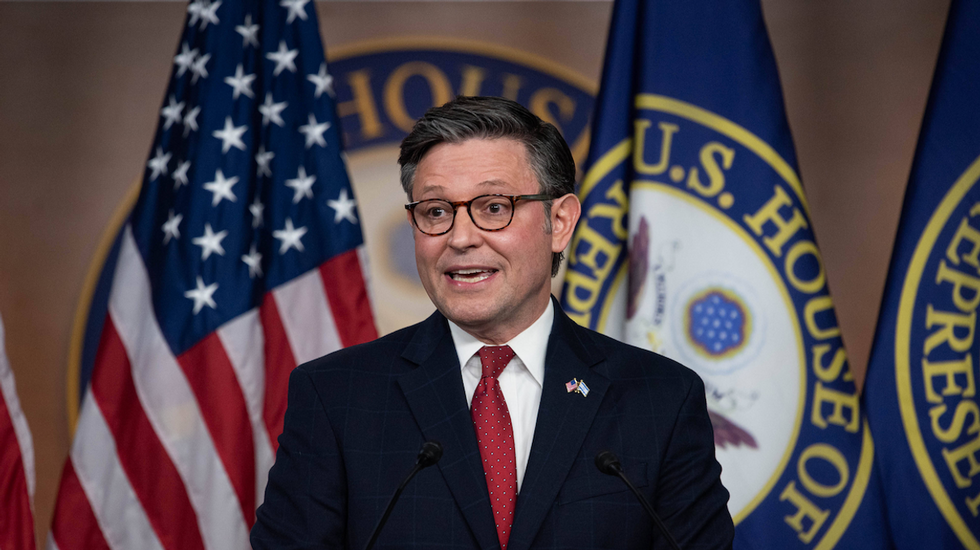 Shutdown averted, but deal contains no aid for Ukrainehttps://www.gzeromedia.com/gzero-north/shutdown-averted-but-deal-contains-no-aid-for-ukraine
Shutdown averted, but deal contains no aid for Ukrainehttps://www.gzeromedia.com/gzero-north/shutdown-averted-but-deal-contains-no-aid-for-ukraine
Ukraine's funding struggle continues as a divided US House finally reached an agreement to avoid a government shutdown but notably did not include military aid for either Ukraine or Israel. Democrats had tried to lump aid for Israel - which received bipartisan support - together with that of Ukraine, which faced resistance from Republicans. The decision is a significant blow to Ukraine, whose somewhat successful resistance against the Russian offensive relied heavily on US funding. What's more, their hopes of getting assistance from the EU face threats from Hungary's Prime Minister Viktor Orbán—an ally of Vladimir Putin.
February 2024: Russia recaptures Avdiivka
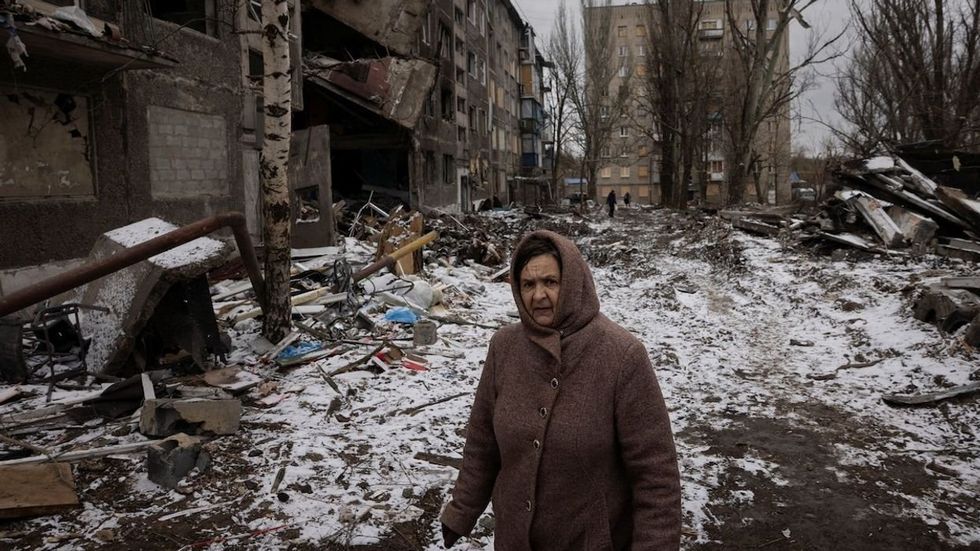 Pro-Russia blogger commits suicide, Russia recaptures Avdiivkahttps://www.gzeromedia.com/news/hard-numbers/hard-numbers-pro-russia-blogger-commits-suicide-uk-nuclear-missile-test-fails-biden-slashes-student-debt-iran-gives-russia-missiles
Pro-Russia blogger commits suicide, Russia recaptures Avdiivkahttps://www.gzeromedia.com/news/hard-numbers/hard-numbers-pro-russia-blogger-commits-suicide-uk-nuclear-missile-test-fails-biden-slashes-student-debt-iran-gives-russia-missiles
In mid-February 2024, Russian forces in Ukraine scored their first major victory in months, taking the strategic town of Avdiivka. A pro-Russian blogger who reported that 16,000 Russian troops had died in the effort faced a huge backlash and committed suicide.
- What Ukraine needs after two years of war with Russia - GZERO Media ›
- What's the plan for Ukraine after two years of war? Ian Bremmer explains - GZERO Media ›
- Ukraine is still standing two years after Russian invasion - GZERO Media ›
- Two years of war in Ukraine: Power players at the Munich Security Conference weigh in - GZERO Media ›
- Greece's PM on NATO, Navalny, and the wake-up call to Europe - GZERO Media ›
- A Russian victory would end the global order, says Yuval Noah Harari - GZERO Media ›
- Moscow terror attack: What happens next? - GZERO Media ›
- Ian Explains: Putin's Ukraine gamble - GZERO Media ›
- Putin trolls Europe about "the master" Trump - GZERO Media ›
- Trump-Putin chat over Ukraine "deeply" worries Europe - GZERO Media ›
- JD Vance stuns Munich conference with critique on European democracy - GZERO Media ›
Russian President Vladimir Putin and Belarusian President Alexander Lukashenko in Minsk, Belarus.
Putin’s muscle flex in Belarus
Russia’s Vladimir Putin is scrambling this week to project strength and confidence in support of a war effort in Ukraine that’s gone terribly wrong. Russian forces have continued their artillery strikes against critical infrastructure targets across Ukraine, temporarily knocking out heat and electricity for civilians in many Ukrainian cities. On Monday, Putin visited Minsk to meet with an ally, Belarus’ President Alexander Lukashenko.
The trip appeared designed to raise Ukrainian and Western fears that Russian soldiers stationed in Belarus – perhaps accompanied by Belarussian troops – will again cross the border to take another shot at capturing Kyiv, Ukraine’s capital, most likely in the spring as ground conditions improve. Russian and Belarussian fighters have again engaged in joint military drills, helping Putin to argue that he does have allies in his war in Ukraine, even if Lukashenko has so far resisted Russian pressure to formally join the war.
Putin’s latest show of strength is intended for three separate audiences. He hopes to weaken Ukrainian resistance by signaling that Russia remains fully committed to punishing Ukraine until its leaders surrender. That message is also meant to boost the arguments of those politicians in Europe and the United States who insist that long-term support for Ukraine is too expensive for their governments in a time of hardship at home. Finally, it’s designed to persuade Russians that Putin has the will to ensure their military will win in the end.
But Putin’s latest muscle flex is unlikely to make much difference. So far, Ukrainian authorities have demonstrated an ability to blunt the force of Russian attacks on infrastructure by intercepting some Russian missiles and drones and also by restoring electricity and heat relatively quickly following each major attack. There’s no sign these artillery attacks have moved Ukraine’s government toward concessions of any kind. There is no reason yet to expect NATO, the EU, or the Biden administration will hedge their bets on Ukraine’s continued resistance.
Nor is there any indication that Putin has managed to change Lukashenko’s mind about committing Belarussian troops to the fight. Even if Belarus joined the battle, the effect would be simply to pull more Ukrainian troops from other regions to repel another attack from the north. The Institute for the Study of War, a Washington-based military think tank, argued in a recent report that a new Russian attack on Kyiv from Belarus is “extraordinarily unlikely to succeed.” Russian forces have been badly degraded since their first run on the capital, and Ukrainians are now much better prepared to play defense.
In short, Putin’s war on Ukraine grinds on with no game-changing breakthrough in sight.
For more on Putin’s attempt to push Lukashenko into a more active role against Ukraine, watch former Swedish PM Carl Bildt’s Europe in 60 Seconds.
Ukrainians in the tech industry ... during war
You are more dependent on Ukrainians than you may realize. Every time you use a ride hailing app, order food with your phone, or even just send an email — there’s a good chance you’ve used software designed or maintained by someone in the country. In fact, as you read these words, you are depending on the work of coders from Kyiv.
That’s because over the past 10 years Ukraine has become one of the leading sources of talent and outsourcing in IT and software development. On the eve of Russia’s invasion, there were close to 300,000 IT specialists in the country, according to a local IT association.
And the Dutch outsourcing giant DAXX says a fifth of Fortune 500 countries have development teams there. Last year, Ukraine exported nearly $7 billion in IT services, accounting for one-tenth of all goods and services it sold to the rest of the world.The country’s proximity to the rest of Europe, competitive wages, and a strong Soviet-era tradition of engineering and sciences education have all drawn international interest, says Andrea Breanna, CEO of RebelMouse, which provides web design and client management services to a number of companies — including GZERO Media.
Now, even with Russian rockets and artillery raining down on Ukrainian cities, many of those professionals are still hard at work.One of them is Alina Kravchenko, a RebelMouse developer living in Myrhorod, a once-bustling resort town in central Ukraine. She says that while many of her fellow developers left for Poland, she stayed because her husband, who is of fighting age, wouldn’t be allowed to leave with her.
Working at night to stay on New York time, Alina has, like others in Myrhorod, papered over her windows to keep her lights from attracting the attention of Russian fighters, drones, or reconnaissance.
Still she considers herself “one of the lucky ones” she says. “I have chosen this profession, and I'm working for a foreign company. If you have internet and if you have electricity, you are able to work and you will get your income.” Other Ukrainian tech leaders actually went back to the country as the war was starting.
Oleksandr Kosovan, is the CEO of Macpaw, which makes a variety of apps for Mac users. Amid rumors of war in January, he took his family to safety abroad.But then, he says, he returned to Kyiv just before the Russian assault began. While nearly half of his 400 employees have since left the country, he stayed.
“I decided that it would be really difficult to explain to my kids, to look into their eyes, and explain why we lost our home, why we lost our country,” he says. “I think it was one of the bravest decisions in my life.”
He says his company has prepared emergency kits for employees, set up plans to automate their operations in case the power goes out, and secured databases of client information that could be captured by Russian troops.
For now, so long as the electricity is on, tech pros like Kosovan and Kravchenko continue to work. And they’re optimistic that when the war is over, the industry may be even stronger as Ukraine seeks to rebuild.
“The easiest way to recover the economy will be through businesses that are easy to scale, easy to recover,” says Kosovan. “So I still think that it will be major industry for Ukraine, and even bigger in the future.”
